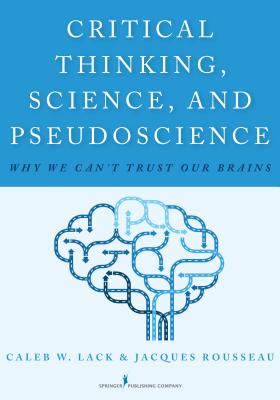Critical Thinking, Science, and Pseudoscience: Why We Can't Trust Our Brains

Critical Thinking, Science, and Pseudoscience: Why We Can't Trust Our Brains
This unique text for undergraduate courses teaches students to apply critical thinking skills across all academic disciplines by examining popularpseudoscientific claims through a multidisciplinary lens. Rather than merely focusing on critical thinking, the text incorporates the perspectives ofpsychology, biology, physics, medicine, and other disciplines to reinforce different categories of rational explanation. Accessible and engaging, itdescribes what critical thinking is, why it is important, and how to learn and apply skills that promote it. The text also examines why critical thinkingcan be difficult to engage in and explores the psychological and social reasons why people are drawn to and find credence in extraordinary claims.
From alien abductions and psychic phenomena to strange creatures and unsupported alternative medical treatments, the text uses examples from a wide rangeof pseudoscientific fields and brings evidence from diverse disciplines to critically examine erroneous claims. Particularly timely is the text'Äôsexamination of how, using the narrative of today'Äôs 'Äúculture wars, 'Äù religion and culture impact science. The authors focus on how the human brain, rife withnatural biases, does not process information in a rational fashion, and the social factors that prevent individuals from gaining an unbiased, criticalperspective on information. Authored by a psychologist and a philosopher who have extensive experience teaching and writing on critical thinking andskeptical inquiry, this work will help students to strengthen their skills in reasoning and debate, become intelligent consumers of research, and makewell-informed choices as citizens.
KEY FEATURES:
- Addresses the foundations of critical thinking and how to apply it through the popular activity of examining pseudoscience
- Explains why humans are vulnerable to pseudoscientific claims and how critical thinking can overcome fallacies and biases
- Reinforces critical thinking through multidisciplinary analyses of pseudoscience
- Enlightens using an engaging, entertaining approach
- Features teaching resources including an Instructor'Äôs Guide and PowerPoint slides
PRP: 663.16 Lei
Acesta este Prețul Recomandat de Producător. Prețul de vânzare al produsului este afișat mai jos.
596.84Lei
596.84Lei
663.16 LeiLivrare in 2-4 saptamani
Descrierea produsului
This unique text for undergraduate courses teaches students to apply critical thinking skills across all academic disciplines by examining popularpseudoscientific claims through a multidisciplinary lens. Rather than merely focusing on critical thinking, the text incorporates the perspectives ofpsychology, biology, physics, medicine, and other disciplines to reinforce different categories of rational explanation. Accessible and engaging, itdescribes what critical thinking is, why it is important, and how to learn and apply skills that promote it. The text also examines why critical thinkingcan be difficult to engage in and explores the psychological and social reasons why people are drawn to and find credence in extraordinary claims.
From alien abductions and psychic phenomena to strange creatures and unsupported alternative medical treatments, the text uses examples from a wide rangeof pseudoscientific fields and brings evidence from diverse disciplines to critically examine erroneous claims. Particularly timely is the text'Äôsexamination of how, using the narrative of today'Äôs 'Äúculture wars, 'Äù religion and culture impact science. The authors focus on how the human brain, rife withnatural biases, does not process information in a rational fashion, and the social factors that prevent individuals from gaining an unbiased, criticalperspective on information. Authored by a psychologist and a philosopher who have extensive experience teaching and writing on critical thinking andskeptical inquiry, this work will help students to strengthen their skills in reasoning and debate, become intelligent consumers of research, and makewell-informed choices as citizens.
KEY FEATURES:
- Addresses the foundations of critical thinking and how to apply it through the popular activity of examining pseudoscience
- Explains why humans are vulnerable to pseudoscientific claims and how critical thinking can overcome fallacies and biases
- Reinforces critical thinking through multidisciplinary analyses of pseudoscience
- Enlightens using an engaging, entertaining approach
- Features teaching resources including an Instructor'Äôs Guide and PowerPoint slides
Detaliile produsului










